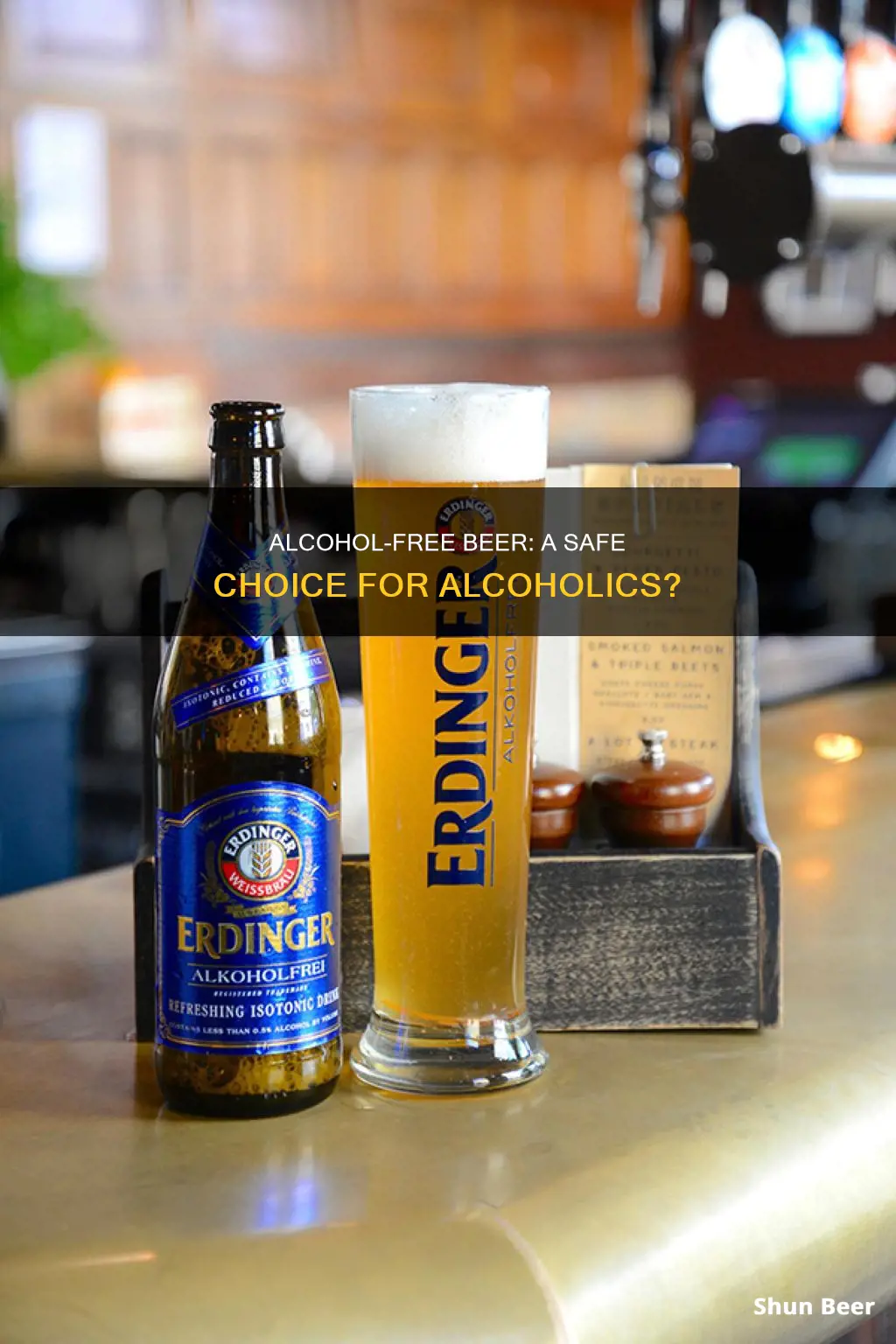
Alcohol-free beer is often marketed as a healthier alternative to alcoholic beer, but is it a good option for people suffering from alcoholism? Alcohol-free beer still contains trace amounts of alcohol, and the psychological impact of drinking it can be significant for people in recovery. While some people in recovery find that non-alcoholic beer helps them feel included in social settings, others worry that it could trigger cravings and lead to a relapse. So, the decision to drink non-alcoholic beer during sobriety is a personal one that requires careful self-reflection.
| Characteristics | Values |
|---|---|
| Alcohol content | Most non-alcoholic beers contain up to 0.5% alcohol by volume (ABV). |
| Health benefits | Non-alcoholic beer can help reduce calorie intake and lower the risk of chronic diseases associated with alcoholism |
| Taste | Non-alcoholic beer is designed to match the taste of standard beers. |
| Social benefits | Non-alcoholic beer can help individuals avoid alcohol without drawing attention to their abstinence in social settings. |
| Psychological impact | For some individuals, the taste and ritual of drinking beer, even without alcohol, can act as a trigger, potentially leading to cravings for alcoholic beverages. |
| Addiction treatment | Some addiction treatment programs may prohibit the consumption of non-alcoholic beer, especially in the early stages of recovery. |
| Individual differences | The decision to consume non-alcoholic beer during sobriety is usually a personal choice, depending on one's triggers and definition of sobriety. |
What You'll Learn

Non-alcoholic beer can still contain alcohol
Non-alcoholic beer is often marketed as a safe alternative to alcoholic drinks, but it's important to be aware of the risks before consuming it. While non-alcoholic beer typically contains significantly less alcohol than regular beer, it may still contain small amounts of alcohol. By law, non-alcoholic beers can contain up to 0.5% alcohol by volume (ABV) in the United States. This means that it is highly unlikely for a person to get drunk from drinking non-alcoholic beer, but it does still contain alcohol.
Research has found that many non-alcoholic beers contain more alcohol than their labels indicate. A 2010 study published in the Canadian Journal of Clinical Pharmacology tested 45 beverages claiming to contain no or low alcohol content. The study found that 29% of the beverages had higher alcohol levels than stated on their labels. Additionally, 6 beverages labelled as having 0.0% ABV were found to contain alcohol, with levels up to 1.8% ABV.
The amount of alcohol in non-alcoholic beers can vary, so it is important to check the labels before consuming them. While some products claim to have 0.0% ABV, it is important to be aware that these labels should be taken with a grain of salt. Even beers that claim to have 0.5% ABV or less may provide significantly more alcohol than advertised.
The presence of alcohol in non-alcoholic beers can pose risks to certain populations, such as those with alcohol use problems and pregnant individuals. For individuals with alcohol use disorder, the smell and taste of beer may serve as a trigger and lead to a relapse. Additionally, non-alcoholic beer may not be a safe choice for pregnant women, as it may still contain small amounts of alcohol that could pose risks to the developing fetus.
In rare instances, drinking non-alcoholic beer can cause a sharp increase in blood alcohol levels, particularly in people with alcohol-related liver damage. This can lead to positive alcohol urine or breath tests, even when consuming beverages labelled as alcohol-free. Therefore, it is important for individuals who need to completely abstain from alcohol to be aware of the potential risks associated with non-alcoholic beer.
Beer and Low-Sodium Diets: What You Need to Know
You may want to see also

It can trigger cravings and lead to a relapse
Alcohol-free beer can trigger cravings and lead to a relapse for recovering alcoholics. The drink can be a powerful trigger, creating cravings that set up the circumstances for a relapse. The risk is not worth sacrificing sobriety over.
The look, smell, taste, and even the label and bottle of non-alcoholic beer are identical to those of normal beer. The same sensory experiences associated with drinking beer, minus the intoxicating effect, can cause frustration. Non-alcoholic beer can trigger a condition known as euphoric recall, a form of selective memory in which a recovering addict glamorizes their active addiction while ignoring all the negative effects it had on their life. In the face of extreme cravings, this problem intensifies even more.
For a recovering alcoholic, drinking non-alcoholic beer serves as a slippery slope. Even though they won't get drunk, the urges and triggers it creates can be too powerful. It's essential to move out of the structure of treatment and establish new hobbies, friendships, and behaviours that don't revolve around drinking.
The desire to drink non-alcoholic beer may indicate that one is not fully committed to recovery and is not entirely willing to leave the negativity of their addiction behind. It could also suggest that one has not fully addressed the reasons behind their substance abuse problem, which might indicate the need for an environment with additional structure and accountability.
Cockpit Beer Rules: Who Can Drink and When?
You may want to see also

It can be a behavioural crutch
Non-alcoholic beer can be a powerful trigger for recovering alcoholics, creating cravings that can lead to a relapse. The taste, smell, and appearance of non-alcoholic beer are almost identical to regular beer, and this can be a significant trigger for someone in early recovery. The same sensory experiences associated with drinking beer, minus the intoxicating effect, can cause frustration and trigger a condition known as "euphoric recall". This is a form of selective memory in which a recovering addict glamorizes their active addiction while ignoring all the negative effects it had on their life.
For a recovering alcoholic, drinking non-alcoholic beer can serve as a "slippery slope". Even though you won't get drunk, the urges and triggers it creates can be too powerful. It can be a behavioural crutch that hinders the development of new habits, friendships, and behaviours that don't revolve around drinking.
The decision to consume non-alcoholic beer during recovery is a personal one, and it's important to carefully consider the potential risks and benefits. Some people may find that non-alcoholic beer helps them feel included in social settings where alcohol is present, allowing them to participate in the social ritual of drinking without compromising their sobriety goals. However, for others, it may be too much of a trigger and a reminder of their past drinking habits.
It's crucial to be aware of individual triggers and to make informed decisions that support long-term well-being and recovery.
Adipex and Alcohol: Is It Safe to Mix?
You may want to see also

It can trigger euphoric recall
Alcohol-free beer can be a controversial topic in recovery communities. While some people in recovery find it helpful to have a non-alcoholic option in social situations, others believe that it can trigger cravings and lead to a relapse. This is where the concept of "euphoric recall" comes into play.
Euphoric recall is a cognitive bias that describes the tendency to remember past experiences positively while overlooking negative experiences associated with those events. It is commonly associated with substance dependence and can be a disruptive factor in addiction recovery. When an addict experiences euphoric recall, they recall their substance use with happiness and comfort, pushing aside the negative consequences of their addiction. This can lead to a "psychic numbness" that overrides the feelings of loss and pain that initiated their recovery journey.
The sensory experience of drinking alcohol-free beer, including its taste, smell, and appearance, can trigger euphoric recall in recovering alcoholics. The ritual of drinking beer may remind them of the "good times" of drinking, causing them to glamorise and romanticise alcohol consumption. This can lead to a strong compulsion to drink again, as the individual craves the feelings of happiness and excitement associated with alcohol use.
The risk of euphoric recall is that it can lead to relapse, as the individual may become obsessed with recreating the remembered pleasures of past drinking episodes. They may develop a sense of positive expectancy, believing that substance use can provide immediate relief and change their lives for the better. This distorted thinking can result in a cycle of addiction, as the individual fails to recognise the negative impacts of their behaviour.
To prevent euphoric recall and its potential consequences, individuals in recovery can employ various strategies. These include creating a relapse prevention plan, joining a recovery community, and practising grounding techniques to bring awareness back to the present moment. Additionally, cognitive-behavioural interventions, such as cognitive restructuring, can help individuals recognise and alter their automatic thoughts and expectations surrounding substance use.
Antibiotics and Alcohol: One Beer, Any Harm?
You may want to see also

It may not be suitable for those with specific medical conditions
Alcohol-free beer may not be suitable for those with specific medical conditions. In some cases, certain medical conditions may require complete abstinence from all forms of alcohol, even in the trace amounts found in non-alcoholic beers. This could be due to potential interactions with medications or the nature of the health condition itself, such as pregnancy, breastfeeding, or liver disease.
For individuals with a history of alcohol addiction, non-alcoholic beer may pose challenges during recovery. While it does not cause intoxication, the drink can trigger cravings and set the stage for a relapse. The taste, smell, and appearance of non-alcoholic beer closely resemble those of regular beer, evoking strong sensory memories of drinking and potentially triggering a condition known as "euphoric recall". This phenomenon involves a recovering addict selectively recalling the positive aspects of their drinking days while downplaying the negative consequences.
Additionally, non-alcoholic beer can serve as a behavioural crutch, hindering the development of new habits, friendships, and activities that are crucial for successful recovery. It is recommended that those in recovery avoid old drinking habits and environments, as they can trigger urges and cravings.
The decision to consume non-alcoholic beer during sobriety is a personal one and should be made with careful consideration. It is essential to understand that non-alcoholic beer still contains a small amount of alcohol, typically up to 0.5% alcohol by volume (ABV). For some individuals, even this minimal alcohol content may be significant enough to warrant avoidance.
Non-Alcoholic Beer: Under 21s and Their Drinking Options
You may want to see also
Frequently asked questions
Non-alcoholic beer still contains trace amounts of alcohol, so it may not be suitable for those who need or want to avoid alcohol completely. For some, even this minimal alcohol content is enough to necessitate avoidance. However, for others, it may be considered negligible.
The drink can be a powerful trigger, creating cravings that set up the circumstances for a relapse. The look, smell, taste, and label of non-alcoholic beer are similar to those of regular beer, and this can be a significant trigger for someone in early recovery.
Non-alcoholic beer can provide a sense of normalcy and inclusion in social settings where alcohol is present. It allows individuals to participate in the social ritual of drinking without compromising their sobriety goals.







